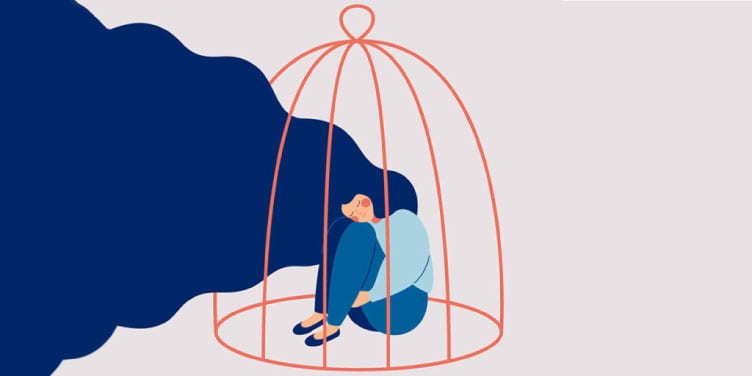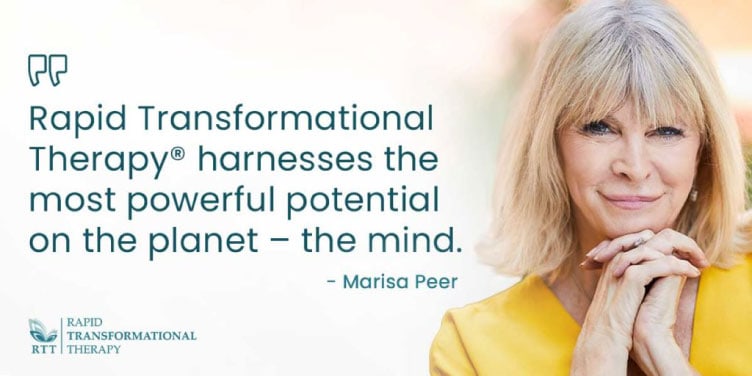The biggest signs of victim mentality are if you feel like external circumstances are controlling your life, feeling like you constantly have bad luck, or that life is happening to you instead of for you.
Objectively, there are times when bad things do happen to you, and it’s okay to feel like it wasn’t your fault and that things were out of your control (because they were). However, it’s also important to recognize when you may have a victim mindset, which keeps you locked in a cycle of pessimism, fear, and self-sabotage.
If this sounds familiar—don’t worry. You do have the power to change it, and we’ll show you how to do it. We’ll explore what “victim mentality really is, and how you can free yourself from this disempowering mindset.
In this article, you will learn:
- What victim mentality is
- Major signs and symptoms of victim mentality
- Causes of victim mindset
- How to break free from it to achieve success and happiness
So what exactly is victim mentality?
What Is Victim Mentality?
Victim mentality is a belief that one is always a victim of circumstances and expectation that bad things will happen. It is a disempowering worldview: you believe that your success, well-being, and happiness all depend on your (often bad) luck.
When things don’t go your way, you believe that there’s nothing you can do about it. You feel completely helpless to change your circumstances.
Essentially, victim mentality is allowing the responsibility of taking care of yourself to shift from you to external factors.
Over time, self-victimization could lead to other symptoms such as rage, loneliness, and depression.
Additionally, people with victim mindset tend to unconsciously sabotage their careers, lives, and relationships, which sets them up for a compromised life. They are more likely to settle for a job they hate, be stuck in unfulfilling relationships, and completely neglect their physical and emotional wellbeing.
What Are the Signs of Having a Victim Mentality?

Victim mentality usually involves some or all of the following beliefs and behaviors:
1. Not taking responsibility for your actions
If you have victim mindset, you avoid taking charge of your life. This means you believe that when something bad happens to you, it’s just your bad luck; inversely, when good things happen to you, it happened by blind chance (and will never repeat again).
In essence, having victim mentality means refusing to take responsibility for your actions. When things don’t go your way, your first impulse is to blame external factors. It’s traffic, bad weather, your upbringing, your natural abilities or a lack of, your level of education, your financial situation—it’s always the fault of someone or something else rather than your own.
2. Every setback is a worst-case scenario
Those who suffer from victim mentality have a tendency to catastrophize their setbacks. They tend to automatically assume the worst when something doesn’t go their way.
For example, a student who fails a test may go on to thinking that this will drastically affect their academic record; in turn, this will eliminate their chances for getting into a good school or a good job; eventually, they may end up homeless and begging for money.
It’s an extremely unlikely situation, but in their minds, even a minor setback signifies the start of a downward spiral of which they are helpless against.
3. You tend to publicize your problems
When you suffer from victim mentality, you tend to complain about it publicly. Your inclination would be to tell someone of your misfortune, with the hopes of asking for help or earning sympathy.
It’s not a bad thing to ask for help when you need it. However, a person suffering from self-victimization doesn’t recognize their own ability to help themselves.
If you find that you are constantly asking for help from others and expect people to sympathize with you, it may be time to reassess your mindset.
4. You feel powerless and not in control
Have you ever felt as though you just have extremely bad luck in life and you just weren’t meant for better things?
You feel this way mainly because you’ve lost belief in your own agency—the idea that you can change your circumstances.
If you suffer from victim mentality, you may believe that things are bad simply because “that’s just how it is.” Worse yet, you may think that no matter what you do, nothing will ever change.
In a way, this becomes a self-fulfilling prophecy. When you take no action to change your situation, everything stays the same and you get stuck in a negative loop.
Victim vs. “Victim Mentality”

Unfortunately, there are people who became a victim of a tragic event and struggle to cope with their trauma. It’s natural to feel helpless while trying to come to terms with what happened.
Right after the traumatic event, many victims might find it difficult to move on. However, processing trauma healthily means recognizing that despite the trauma, the person is still responsible for their own happiness, success, and well-being.
Getting on the path to recovery comes with a belief that things can change and being open to happiness and success in the future.
If this sounds like you, don’t allow your past tragedy to define you. Eventually, you’ll be able to break the cycle of self-pity and begin to accept your painful past.
People with victim mentality, on the other hand, believe that things can’t get better, no matter what they do.
Consequently, they give up. They adopt a passive role, choosing to believe that they are simply not meant for better things. Experts call this learned helplessness, and it can spread to other aspects of their life.
In a nutshell, a victim is someone who experienced a traumatic event but actively tries to regain control, develop emotional resilience, and be accountable for their actions.
On the other hand, a person with victim mindset relinquishes all self-responsibility; they choose to indulge in their misery and are unwilling to face their issues nor try to change their circumstances.
Why Do People Play the Victim? The Benefits of Victim Mentality
It may be surprising to hear that victim mentality actually fulfills many of the psychological needs of an individual’s subconscious mind.
Marisa Peer, a world-renowned therapist, speaker, and best-selling author, believes that the mind has one simple job—to keep you alive as long as possible. To achieve this, your mind is hardwired to move you away from pain and towards pleasure.
In the context of victim complex, self-victimization helps fulfill some of the basic human needs such as connection and safety.
The main benefits of self-victimization include:
Attention
By constantly complaining about your bad luck, people are more likely to give you their attention and offer sympathy. Being treated as a victim puts the sufferer under the spotlight and can make them feel valued, even if it is superficial and temporary.
Power
Ironically, self-victimization can make one feel falsely empowered. Some may use victimhood to manipulate others into doing what they ask by taking advantage of their kindness and sympathy. This makes letting go of victimhood even more difficult because they believe it means relinquishing their power.
Comfort
Not having to do anything about their situation allows the victim to remain in their comfort zone. The rationalization is that there’s nothing they can do anyway, so why bother? This way, those with victim mentality can avoid the pain of taking responsibility for their lives and facing their problems.
According to Marisa Peer, the mind loves what is familiar and comfortable and regards it as a safer option in comparison to doing something new. Unfortunately, it doesn’t realize how devastating self-victimization can be over the long term.
This is why it’s so important to consciously explore these issues and learn ways to stop being a victim.
What Causes Victim Mindset?
Most often, victim mentality develops during childhood. It is often used as a coping mechanism to deal with an early childhood trauma.
In such cases, childhood abuse is often the reason. For example, a parent who continuously berates their child for their shortcomings teaches them to define themselves solely through their failures.
Children could also start “playing the victim” by observing their caretakers or other important figures demonstrate self-victimizing behavior and mindset.
Childhood is a period where you were at your most vulnerable. Without the support of your caretakers, you may have been conditioned to believe that you’re a victim and that you’re helpless against your circumstances.
How Can I Stop Being a Victim?

Self-victimization is a pattern of dysfunctional beliefs and behaviors, which means that you probably have been doing it for a long time.
If you are wondering, “How do I stop victim mentality?”—there’s good news. Because it is a learned behavior, you can unlearn it over time and through consistent and conscious effort.
However, if you’d like to learn of a more powerful method to break your victim mentality and implement empowering thought patterns and behaviors overnight, learn how an RTT® specialist could help you do that.
Here are a few tips on how to break self-victimization:
Start being conscious of your inner thoughts
You may not realize it, but victim mentality has a lot to do with your inner self-talk. Whenever you feel victimized, it usually begins with a thought in your head that says, “I’m not strong enough to handle this.”
Dive deeper into that thought. Take a moment to reflect on why you feel that way. Was this connected to a previous event that made you feel helpless? Or is this based on your history of dealing with similar challenges and not being able to rise up to the occasion?
Once you make listening to your inner thoughts a habit, you’ll begin to have clarity on your thought processes and have a better idea of how to break them.
These tools and tactics can help you become more self-aware:
- Start a journal and write down whenever you have a negative thought or self-talk. These will be helpful when you review them later.
- Meditate, not to quiet your thoughts, but to listen to them. Give your mind a chance to speak and listen to what it’s saying without judgment.
- List down previous events or occasions where you felt helpless or overwhelmed, and reanalyze the situation. Try to understand why you felt the way you did. If that’s too difficult, simply list down possible reasons, which can be powerful clues by themselves.
Challenge your thoughts and behaviors
Once you have better clarity on why you self-victimize, it’s time to challenge yourself. Start by reframing yourself not as a victim but as a victor.
While a victim helplessly waits for rescue on a life raft, a victor takes the paddles and rows to safety. The main difference here is control—you may not be in the ideal situation, but understand that there are things (no matter how small) you can do to help yourself.
Here are a few things you can do:
- Start by questioning the negative thoughts and self-talk you documented earlier. Were they necessarily true? Have you always been a victim, or were there times when you were able to handle a particularly difficult situation on your own?
Chances are, you could not have reached where you are in life by being completely dependent on other people. List down your independent achievements and log them as counter-evidence that you are more powerful than you think.
- Progressively assume responsibility for your life. Start with something small, such as making a promise to yourself to improve your diet or develop a skill. Then, progressively work your way up to bigger things, like finding your dream job or career.
Since self-victimization is really just a pattern of avoiding personal responsibility, it makes sense to train yourself to assume more responsibilities over time.
Consistently practice self-responsibility and self-empowerment
Since you are unlearning dysfunctional behavior, understand that this process will take discipline, consistency, and time.
The most important thing is to keep working on yourself and make accountability and self-responsibility a habit. With practice, you’ll begin to subconsciously adopt a more empowered mindset.
Here are a few tips that can help:
- Start your day with self-affirmations. Say to yourself, “I am powerful and responsible for me. No one else is in charge of my wellbeing and happiness.” Repeat this mantra whenever you start feeling like you’re a victim.
- Progressively break dysfunctional habits. For example, if you’re used to asking for help from someone, ask them to teach you the solution so you can be self-sufficient. Start with smaller problems and work your way up towards bigger ones.
- Be a problem-solver. Rather than focus on the issue, get into a solutions mindset. When you experience a setback, don’t focus on the problem, instead, write down what you can do to change the situation for the better.
You’ll find that developing an action plan alone is enough to change your mindset from that of a victim to an empowered person.
The Most Powerful Method To Breaking Your Victim Mentality

If you find it difficult to break your victim mentality due to anxiety, fears, or previous trauma, know that there is help.
Victim mindset is difficult to break because it’s usually the product of years of dysfunctional behavior and thought patterns.
The root problem is in your subconscious—the deeper part of your mind that determines what you believe in and how you act.
As a child, your subconscious mind picked up every word you heard and every thought you had. It didn’t care whether the thought was good, bad, true, false, healthy, or unhealthy—it simply absorbed it and regarded it as truth.
So if you were conditioned to be a victim when you were a child, your subconscious continues to find confirmation of this thought and behavior, even as an adult.
Your subconscious works as a sort of “blueprint,” governing your every thought and action, making it either incredibly destructive or incredibly powerful.
The tips mentioned above can help you change your behavior consciously. However it’s difficult to be constantly aware of your thought processes all the time. It will take discipline and time to transform conscious effort into subconscious belief.
For a more rapid and permanent solution to breaking your victim mentality, the key is to address your subconscious directly.
Introducing Rapid Transformational Therapy®
A Rapid Transformational Therapy® (RTT®) therapist can help you tap directly into your subconscious and remove existing mental blocks, reprogramming your mind to break self-victimizing behavior and cultivate empowering ones instead.
Marisa Peer is the founder of RTT®, which she developed after working with thousands of clients over her thirty-year career as a therapist. She has successfully transformed the lives and careers of her clients all over the world, including celebrities, royalty, top athletes, and CEOs.
The best-selling author of six books, Marisa combines the best principles of hypnosis, cognitive behavioral therapy (CBT), neuro-linguistic programming (NLP), neuroscience, and hypnotherapy to create a one-of-a-kind therapy approach that is remarkably effective and sets you on the quick path towards psychological well-being.
To date, she has trained thousands of students to deliver a completely individualized approach to each client. Many have reported seeing changes in as few as one to three sessions after seeing an RTT® therapist.
Removing victim mentality is the key to helping you take personal responsibility for your life. Once you shift your mindset from victim to victor, you’ll be able to change your circumstances and achieve success, happiness, and your true potential.


